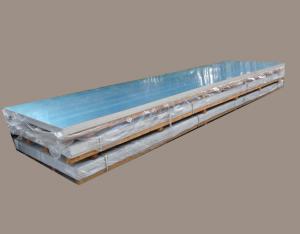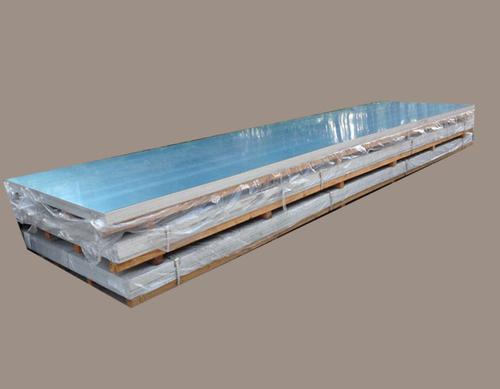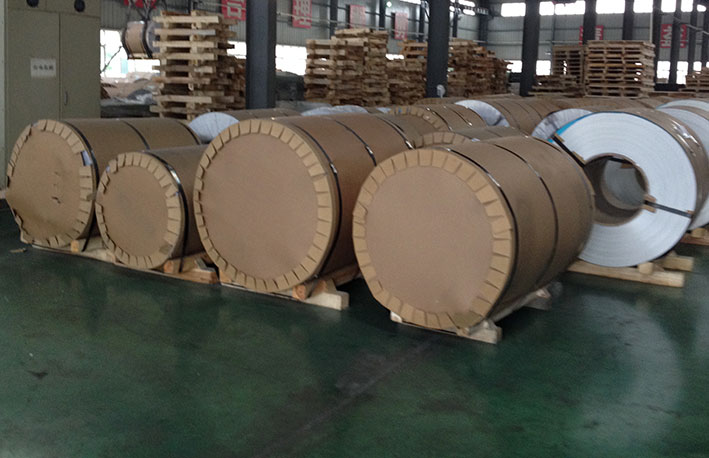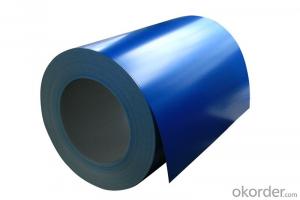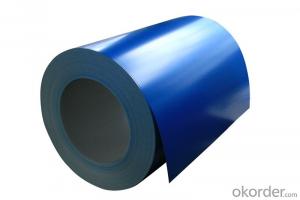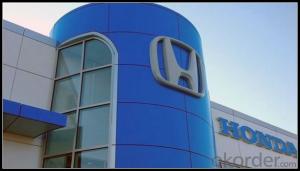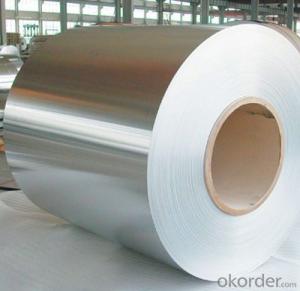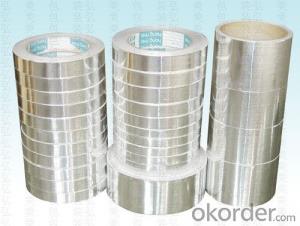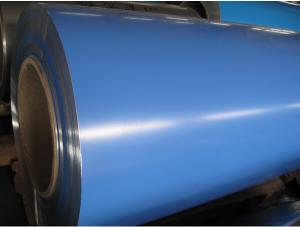2024 Aluminum Coil with PE Film on the Main Side
- Loading Port:
- Qingdao
- Payment Terms:
- TT or LC
- Min Order Qty:
- 5 m.t.
- Supply Capability:
- 100000 m.t./month
OKorder Service Pledge
OKorder Financial Service
You Might Also Like
1. Structure of Aluminum Coil with PE Film on the Main Side
Aluminium is a relatively soft, durable, lightweight,ductile and malleablemetalwith appearance ranging from silvery to dull gray, depending on the surfaceroughness. It is nonmagnetic and does not easily ignite. A fresh film ofaluminium serves as a good reflector (approximately 92%) of visible light and an excellent reflector(as much as 98%) of medium and far infrared radiation. The yield strengthof pure aluminium is 7–11 MPa, while aluminium alloys have yield strengthsranging from 200 MPa to 600 MPa. Aluminium has about one-third the density and stiffness of steel.It is easily machined, cast, drawnand extruded.
Aluminum coil/sheet have been used in the field of construcction and decoration(garage doors,ceiling etc.),electronic appliances,lignting decoration, air-condition air pipes,sandwichpanels and drainages etc.
2.Main Features of theAluminum Coil with PE Film on the Main Side:
• Smooth surface
• High manufacturing accuracy
• High strength of extension and yield
• Well packaged
• No marks, no scratch, no excessive oil
3. Package of Aluminum Coil with PE Film on the Main Side
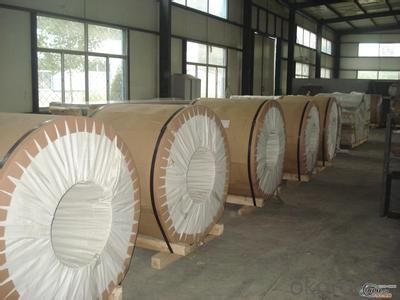
4.FAQ
1. What is the form of payment?
Normally 30% TT, L/C
2. Type of quotation?
FOB, CFR, CIF
3. Port of loading?
Shanghai port
4. Delivery time?
35 day after client’s deposit
5 Our Advantages
1. Excellent quality of products
2. Quick delivery
3. Best service to clients
4. BV,SGS avalible
5. No buckle o waveness
6. Tension leveling
7. Certificate of Origin
8. FormeA,E
- Q: Can aluminum coils be used for pharmaceutical packaging?
- Yes, aluminum coils can be used for pharmaceutical packaging. Aluminum is a popular choice for packaging in the pharmaceutical industry due to its excellent barrier properties, light weight, and resistance to corrosion. It provides a protective and hygienic environment for pharmaceutical products, ensuring their safety and extending their shelf life.
- Q: Can aluminum coils be used for food storage containers?
- Yes, aluminum coils can be used for food storage containers. Aluminum is a safe and commonly used material for food packaging due to its non-toxic, lightweight, and corrosion-resistant properties. It helps to preserve the freshness, flavor, and quality of food while also being recyclable and environmentally friendly.
- Q: How are aluminum coils used in the production of architectural panels?
- Aluminum coils play a crucial role in the production of architectural panels by serving as the primary material for their construction. These coils are typically made from high-quality aluminum alloy, which possesses several desirable characteristics such as lightweight, corrosion resistance, and malleability. The first step in using aluminum coils for architectural panels involves uncoiling the raw material. The coils are unwound and flattened to create flat sheets of aluminum. These sheets are then cut to the desired size and shape, depending on the specific architectural panel design requirements. Once the aluminum sheets are prepared, various manufacturing techniques can be used to further process them. These techniques include bending, folding, welding, and punching to achieve the desired panel shape and functionality. The malleability of aluminum allows for precise shaping and customization, making it an ideal material for architectural panel production. Additionally, aluminum coils can be coated or treated to enhance their appearance, durability, and performance. Coatings such as paint, powder coating, and anodizing can be applied to the aluminum surface to provide protection against weathering, UV radiation, and corrosion. These coatings can also offer aesthetic options, allowing architects and designers to choose from a wide range of colors and finishes for their architectural panels. Architectural panels manufactured using aluminum coils offer numerous benefits. Firstly, due to the lightweight nature of aluminum, these panels are easier to handle and install, reducing labor costs and time. Additionally, aluminum's corrosion resistance ensures that architectural panels remain durable and visually appealing even in harsh weather conditions. The malleability of aluminum also allows for intricate designs and complex shapes, enabling architects to create visually striking and unique building facades. In conclusion, aluminum coils are an essential component in the production of architectural panels. Their lightweight, corrosion resistance, and malleability properties make them an ideal material for creating durable and aesthetically pleasing panels. Whether it is for high-rise buildings, residential homes, or commercial structures, aluminum coils are instrumental in the production of architectural panels that enhance the visual appeal and functionality of modern architecture.
- Q: How do aluminum coils contribute to the corrosion resistance of products?
- Aluminum coils contribute to the corrosion resistance of products in several ways. Firstly, aluminum itself is a highly corrosion-resistant material due to its natural oxide layer that forms on its surface when exposed to oxygen. This oxide layer acts as a protective barrier, preventing further oxidation and corrosion. When aluminum is formed into coils, it offers additional advantages for corrosion resistance. The coil form allows for a more uniform distribution of the material, ensuring that the protective oxide layer covers the entire surface area of the product. This helps to prevent localized corrosion and ensures a more consistent level of corrosion resistance across the entire product. Moreover, aluminum coils can also be coated with various protective coatings or treatments to enhance their corrosion resistance further. These coatings can provide an additional layer of protection against environmental factors such as moisture, chemicals, and UV radiation, which can accelerate corrosion. Additionally, aluminum coils are often used in combination with other materials in products, such as galvanized steel or stainless steel. These combinations, known as bimetallic or trimetallic products, take advantage of the different properties of each material to enhance corrosion resistance. For example, the aluminum layer can act as a sacrificial anode, corroding preferentially to protect the underlying material from corrosion. In summary, aluminum coils contribute to the corrosion resistance of products due to the inherent corrosion resistance of aluminum, the uniform distribution of the material in coil form, the possibility of applying protective coatings, and the use of bimetallic or trimetallic combinations. These factors help to ensure that products made with aluminum coils have a longer lifespan and are better protected against corrosion in various environments.
- Q: Are aluminum coils suitable for outdoor signage?
- Yes, aluminum coils are suitable for outdoor signage. Aluminum is a durable and weather-resistant material that can withstand various outdoor elements, such as rain, sunlight, and temperature changes. It is also lightweight, which makes it easier to install and transport. Additionally, aluminum coils can be easily shaped and formed into different designs, allowing for versatile and eye-catching signage options.
- Q: What are the different coil transportation options for aluminum coils?
- There are several different coil transportation options available for aluminum coils. 1. Flatbed Trucks: Flatbed trucks are commonly used for transporting aluminum coils. These trucks have an open top and are equipped with a flat, open trailer bed. The coils are securely strapped or banded onto the bed to prevent any movement during transportation. 2. Coil Racks: Coil racks are specialized transportation equipment designed specifically for carrying aluminum coils. These racks are usually made of steel and are placed inside a truck or trailer. The coils are stacked on the racks, which have dividers to keep them in place and prevent any shifting or damage. 3. Coil Trailers: Coil trailers are trailers that are specifically designed for transporting aluminum coils. These trailers have a unique coil cradle system that securely holds the coils in place during transportation. The cradles are adjustable to accommodate different coil sizes and prevent any movement or damage. 4. Container Shipping: Aluminum coils can also be transported using shipping containers. The coils are loaded into the containers and secured using straps or bracing. This option is commonly used for international transportation, as containers can be easily loaded onto ships or trains. 5. Rail Transport: Rail transport is another option for transporting aluminum coils. Specialized rail cars, known as coil cars, are used for this purpose. These cars have cradles or racks built into them to securely hold the coils during transit. Rail transport is often used for long-distance transportation, as it is a cost-effective and efficient method. Overall, the choice of coil transportation option depends on factors such as distance, cost, and the specific requirements of the coils being transported.
- Q: Can aluminum coils be used for electrical enclosures?
- Yes, aluminum coils can be used for electrical enclosures. Aluminum is a lightweight and durable material that provides excellent electrical conductivity and heat dissipation properties. It also has good corrosion resistance, which makes it suitable for various environmental conditions. Aluminum coils can be easily formed into different shapes and sizes, making them versatile for enclosure designs. Additionally, aluminum is a cost-effective option compared to other metals like stainless steel. However, it is important to ensure proper insulation and grounding when using aluminum coils for electrical enclosures to prevent any electrical hazards.
- Q: Can aluminum coils be used in extreme temperature conditions?
- Yes, aluminum coils can be used in extreme temperature conditions. Aluminum has a high melting point of 660.32°C (1220.58°F) and can withstand extreme heat without deforming or melting. Additionally, aluminum has excellent thermal conductivity, allowing it to quickly transfer heat away from the coil. This makes it suitable for various applications, including air conditioning, refrigeration, and heating systems that may encounter extreme temperature conditions. Moreover, aluminum coils are lightweight and corrosion-resistant, making them a preferred choice in many industries.
- Q: Aluminum is directly below Mg. If aluminum is oxidized so readily, then how can we make planes or ships out of it and they don't fall apart after a few months or years?
- Yes aluminum does oxidize just like any other metal. The difference is that aluminum oxidizes the same color as the metal therefore you cannot tell that is oxidizing. Once is oxidizes a little bit, the oxidize protects the metal and it does not oxidize any more.
- Q: This question asks for precautions that should be taken when handling aluminum coils to ensure safety.
- <p>When handling aluminum coil, it's crucial to follow safety measures to prevent accidents and injuries. Always wear appropriate personal protective equipment (PPE), including gloves, safety glasses, and closed-toe shoes. Ensure that the work area is well-lit and free from clutter to avoid trips and falls. Use lifting equipment, such as cranes or forklifts, for heavy coils and never attempt to lift them manually. Keep the coils dry to prevent corrosion and ensure they are stored properly on wooden pallets or racks to prevent damage. Be aware of the risk of aluminum dust, which can be a fire hazard, and ensure proper ventilation is in place. Regularly inspect the coil for any sharp edges or damage that could cause injury. Always follow the manufacturer's guidelines and adhere to local safety regulations.</p>
Send your message to us
2024 Aluminum Coil with PE Film on the Main Side
- Loading Port:
- Qingdao
- Payment Terms:
- TT or LC
- Min Order Qty:
- 5 m.t.
- Supply Capability:
- 100000 m.t./month
OKorder Service Pledge
OKorder Financial Service
Similar products
Hot products
Hot Searches
Related keywords
